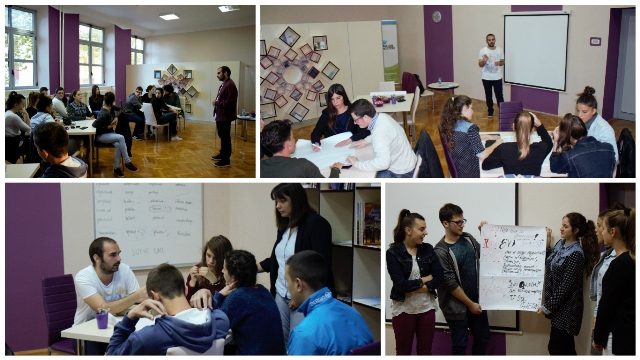Youth club from Cetinje last night organised a workshop on Youth activism, led by the coordinator of Youth group of Centre for Civic Education (CCE) Miloš Knežević.
Knežević discussed with young people about the importance of involvement of young people in the life of communities in which they work and live – from families, through schools to cities and state, as broadest social communities to which they belong. During the workshop, special focus was on activism of young people in the area of human rights, especially considering the potential of young people to significantly contribute in the development of culture of human rights in the society.
Youth activism gives the opportunity to young people for their voice to be heard, to participate in decision-making processes which in turn provides the society a sustainable perspective of development. Nowadays, there are numerous challenges in the development of youth activism, imposed by the social context in which young people live – still traditional relations in families which do not stimulate the participation of child in family life, schools that are dominated by outdated styles of education which remain closed for certain topics that are of importance for the shaping of young people, all of which spread an authoritarian social environment, and with the help of mass media imposes consumeristic culture and passivity of citizens. In such circumstances, few young people believe in the power of activism, while the majority estimates that any attempt to change the situation is futile. Hence, the workshop sought to motivate young people to reflect on the importance of awareness on processes and events which take place in their surroundings, as well as to respond to them, to have the opinion and courage to clearly articulate it. “Silence is not an option for young people who wish to be the actors, and not just mere spectators, in their own lives. Young people should be the agents of changes which are a constant feature of modern society”, Knežević emphasized.
Further, workshop participants had the opportunity to familiarise with contemporary concept of human rights and challenges which members of vulnerable and marginalised groups face in the protection of their rights, such as LGBT persons, women, Roma and persons with disabilities, all through the presentation of CCE’s research on citizens’ perception on discrimination and homophobia. Presentation aroused a dynamic discussion based on which the participants of workshop discussed the examples of respect of human rights in their local community and school, and consequently presented specific solutions which could be used in their overcoming.
During the part of the workshop which related to techniques of youth work and activism, participants were taught about the possibilities on how to transfer the ideas related to solution of certain issues into specific action by using the resources that young people have at their disposal, such as social networks, the internet and cell phones. “Specific action is founded on specific idea and without the considerable means, with the use of easily available resources that can have a powerful echo and impact on the community”, Knežević estimated. Main message of this workshop was that young people must encourage their own potentials rather than dive into the cosiness and comfort of contemporary society, especially of media and technology which only passivates them, instead of using the potentials as means of active participation and propellant of changes.
Workshop on youth activism was organised at the initiative of Youth club from Cetinje and Dejana Rudović, psychology professor at the gymnasium from Cetinje, one of the coordinators of Club. CCE is thankful for the cooperation with Youth club from Cetinje, which, like many other youth initiatives, organisations and high schools, recognised the quality of CCE’s work with young people. CCE remains open for cooperation with every organisation which aims to strengthen youth and student activism in Montenegro.
Svetlana Pešić, programme associate

